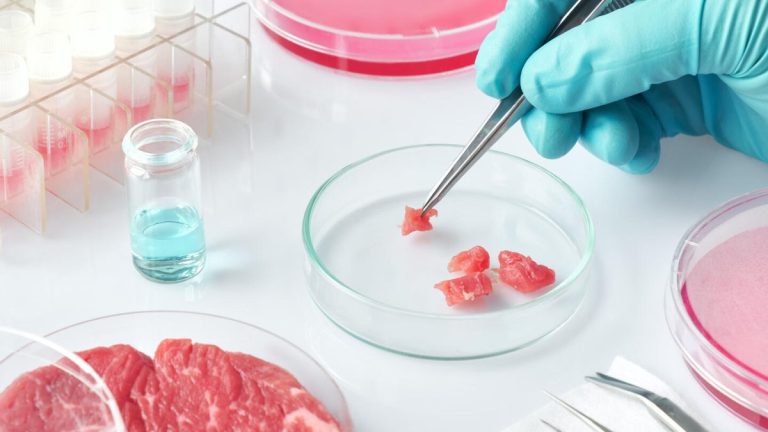For years, companies and scientists have been researching “artificial meat” – i.e. meat that is grown in the laboratory from animal cells. Although there have been initial successes, laboratory meat has not been approved for sale anywhere – until now. The first restaurant in the world is now offering “chicken bites” from the laboratory.
It is a groundbreaking moment for the meat industry, writes the British Guardian: Singapore’s Food Safety Authority has examined chicken meat from the laboratory and approved it for sale. Specifically, these are “chicken bites” from the US company “Eat Just”.

The chicken bites look like little chicken nuggets. They will initially be sold in a single restaurant in Singapore. Since Eat Just has so far produced comparatively little laboratory meat, the artificial chicken bites are more expensive than regular meat. As soon as the company increases its production, they should become cheaper.
A world where animals no longer have to be killed for meat
According to the Guardian, Eat Just grows the cells for the chicken in 1,200 liter bioreactors. The cells come from cell banks, they were obtained from living animals. The company uses “fetal calf serum”, which is obtained from the blood of cow fetuses, as the nutrient medium for the cells.
The serum is often the main component of nutrient media for cell cultures. It is extracted from the hearts of unborn calves, but both the calf and the mother cow die in the process. According to Eat Just, it wants to use a plant-based serum in the next production line.
“I think the approval is one of the most significant milestones in the food industry in the last few decades,” Josh Tetrick, Eat Just’s CEO, told the Guardian. It is now up to his and other companies to take advantage of this opportunity. “My hope is that in the years to come this will lead to a world where the majority of meat doesn’t require killing a single animal or destroying a single tree.”
However, there are also challenges – such as whether consumers will even accept artificial meat. In order to produce enough laboratory meat for Singapore or other countries, much larger bioreactors are also needed. Tetrick spoke in the Guardian of reactors with more than 50,000 liters instead of the current 1,200 liters capacity.
German companies also rely on meat from the laboratory
In addition to Eat Just, there are numerous other companies experimenting with artificial meat. In 2016, the American company Memphis Meats presented the first meatball from the laboratory. There is also interest in Germany – for example, the parent company of Wiesenhof is investing in a start-up that produces laboratory meat. Research into artificial meat began in the Netherlands in the 1990s.

Meat from the laboratory should bring many advantages: Animals no longer have to be raised in factory farming and then slaughtered. This not only reduces animal suffering, but also saves greenhouse gases and resources such as water, animal feed and agricultural land. However, there is also criticism of laboratory meat – above all because of the fetal calf serum as a growth medium. Artificial meat can be an option for those who cannot do without meat. But there are also plenty of plant-based meat substitutes that come close to the taste of meat.
Meat from the laboratory – finally a solution or an absurd idea? would you eat faux meat We would be happy to receive your comments.



